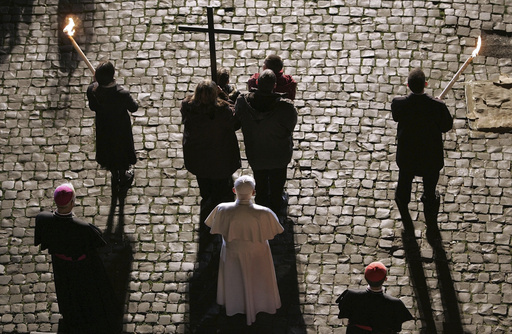
In the latest horror film titled “Heretic,” Hugh Grant takes on the role of a menacing religious skeptic who ensnares two frightened missionaries within his home, attempting to forcibly dismantle their beliefs.
Initially resembling a lecture on religious studies, the plot swiftly transforms into a gruesome escape scenario for the two representatives of The Church of Jesus Christ of Latter-day Saints, highlighting the way religion can effectively evoke both fear and thrill among audiences.
Stacey Abbott, a film professor at Northumbria University in Newcastle, England, offers insights into this blend of horror and religion, pointing out that it challenges the very structure of religious institutions and the patriarchal elements within them.
“It delves deep into the meaning of faith, encouraging the audience to engage in discussions about choice, belief, and free will,” she noted.
The fascination with religious themes in horror is not a new trend; films like “The Exorcist” and “The Omen” from the 1970s are iconic examples that have captivated audiences, particularly in the United States.
Abbott explains that the thrilling aspects of horror, often underscored by supernatural themes, resonate powerfully with spiritual explorations of existence. Horror movies tackle taboo subjects and societal fears while also providing fertile ground for social commentary.
This intersection of death, demons, and human existence is mirrored in both horror and religious narratives, as noted by Brandon Grafius, a Biblical studies professor at the Ecumenical Theological Seminary in Detroit.
“Religion provides a framework for grappling with mortality, helping us derive meaning from it,” Grafius explained. “Horror serves a similar purpose by prompting reflection on death.”
He adds that Christianity offers a wealth of material for filmmakers, deeply rooted in its dualistic nature of good versus evil. Despite a gradual decline in the dominance of Christianity in the U.S., these themes remain ingrained in cultural narratives.
Recent films like those in “The Conjuring” series and titles such as “The First Omen” and “Immaculate” echo contemporary societal issues, with Abbott highlighting how they respond to ongoing debates around religion and control, much like “Heretic.”
Grant, portraying Mr. Reed, admits to sharing some of his character’s skepticism, though not entirely from a religious angle. “I have a tendency to challenge those who appear overly self-satisfied or pretentious,” he remarked.
Exploring the unsettling nature of horror, Rev. Ryan Dun, a Jesuit priest and theology chair at Marquette University, describes it as a mirror reflecting truths people often avoid.
“When religion challenges us, it poses critical questions about our actions and complicity in societal wrongs. In horror, the monster represents a disruption to our norm,” Dun stated.
However, Dun distinguishes horror from religion, asserting that horror typically leaves no escape route. Monsters can be defeated temporarily, but sequels often emerge, unlike in Christianity, which offers hope and pathways to redemption.
Ti West, director of the horror film “MaXXXine,” incorporates religious themes into narratives, suggesting that sometimes morality and religion interlink naturally within stories.
Morton, a notable horror author, cautions that the fusion of horror and religion can falter if mismanaged, particularly when attempting to offend particular belief systems.
However, when executed correctly, this blend can thrive; Morton cites “The Exorcist” as a landmark film and emphasizes its continuing influence.
Abbott concurs that religion should be treated with respect in films, as accuracy enhances the storytelling, especially in horror premises inspired by real rituals.
Osgood Perkins, who created the horror film “Longlegs,” admits to crafting religious elements from both imaginative and genuine influences.
“For me, it’s about creation,” Perkins shared. “When you encounter something profound in religious texts, it resonates deeply.”
Dun believes that a thoughtful portrayal of religious symbols and rituals in horror enriches the narrative, noting that centuries of tradition have imbued them with significant power.
“Casual portrayals strip symbols of their potency,” he concluded, underlining the importance of thoughtful representation in horror.
